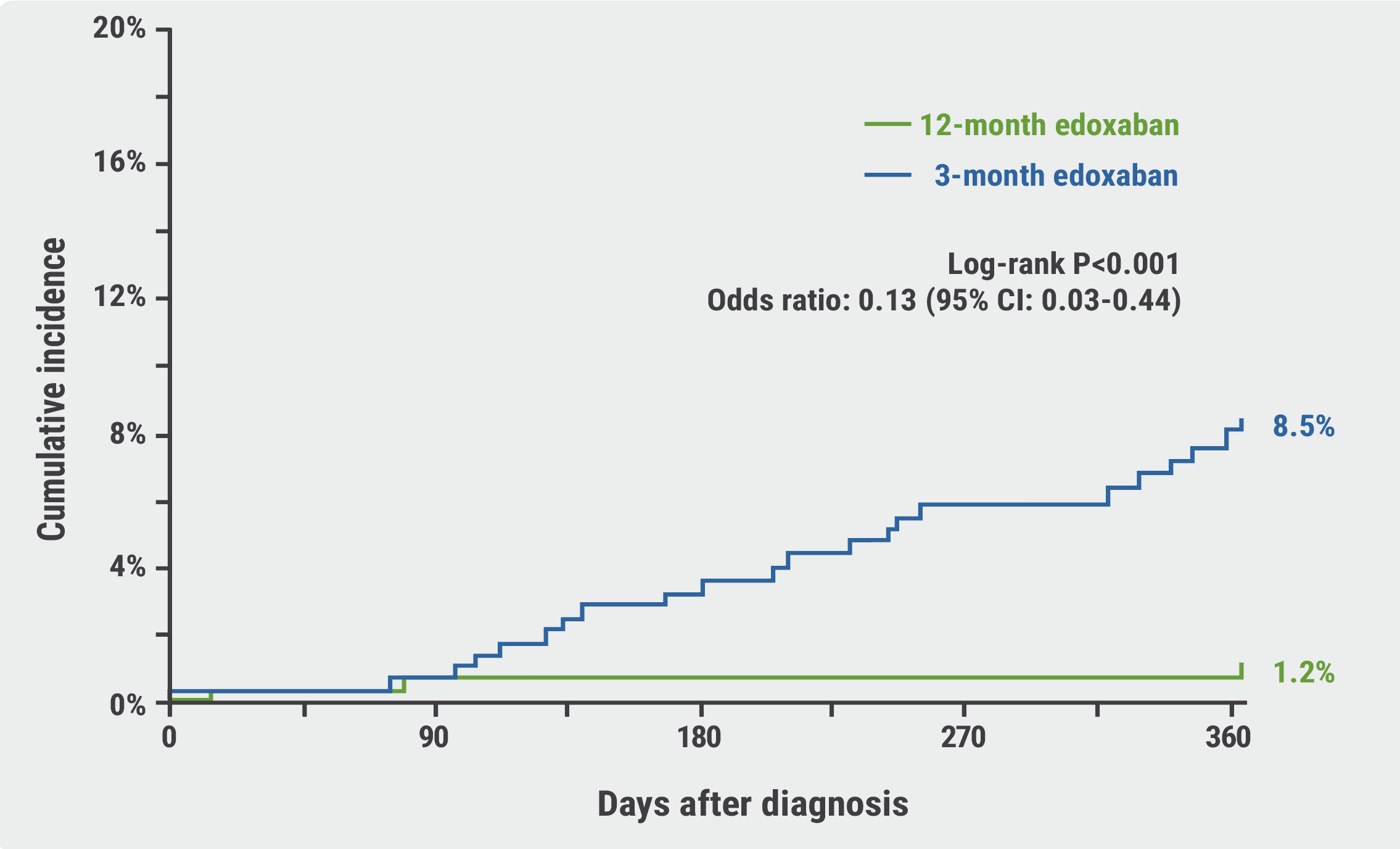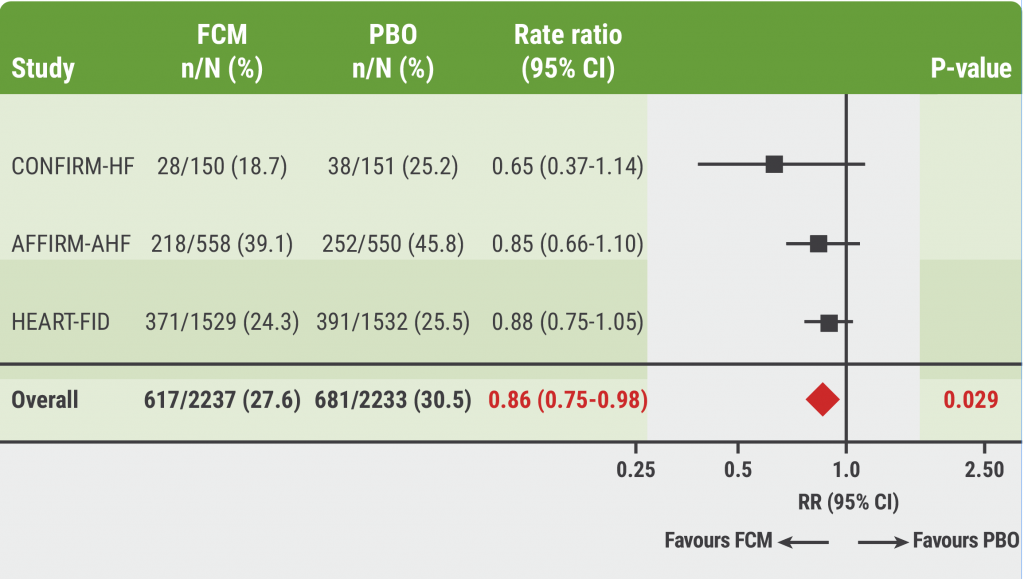https://doi.org/10.55788/2d936feb
“Although there are guideline recommendations for the management of isolated distal DVT, the subgroup of cancer patients has not been well studied,” stated Dr Yugo Yamashita (Kyoto University, Japan) [1]. “No randomised-controlled trials have been conducted to establish the optimal duration of anticoagulation therapy in these patients.” The open-label, adjudicator-blinded ONCO DVT study (NCT03895502) compared a 12-month and a 3-month edoxaban treatment period in patients with cancer and newly diagnosed isolated distal DVT. In total, 604 participants were randomised to 1 of the 2 study arms. The primary endpoint was symptomatic recurrent VTE or VTE-related death at 12 months.
Symptomatic recurrent VTE or VTE-related death occurred more frequently in participants who received 3 months of edoxaban therapy than in those who were randomised to the 12-month treatment period (8.5% vs 1.2%; OR 0.13; 95% CI 0.03–0.44; P<0.001; see Figure). There was no significant difference between the prolonged-treatment arm and the short-term treatment arm in the key secondary endpoint of major bleeding (10.2% vs 7.6%; OR 1.34; 95% CI 0.75–2.41). The subgroup analysis did not reveal any significant interaction effects.
Figure: Primary endpoint of symptomatic recurrent VTE or VTE-related death [1]

In summary, cancer patients with isolated distal DVT had a reduced risk for symptomatic recurrent VTE or VTE-related death if they were treated with 12 months rather than 3 months of anticoagulation therapy.
- Yamashita Y, et al. Edoxaban for 3 months versus 12 months in cancer patients with isolated distal deep vein thrombosis: ONCO DVT Study. Hot Line Session 9, ESC Congress 2023, 25–28 August, Amsterdam, the Netherlands.
Copyright ©2023 Medicom Medical Publishers
Posted on
Previous Article
« Expedited transfer to a specialised centre does not improve cardiac arrest outcomes Next Article
DICTATE-AHF: Early dapagliflozin to manage acute HF »
« Expedited transfer to a specialised centre does not improve cardiac arrest outcomes Next Article
DICTATE-AHF: Early dapagliflozin to manage acute HF »
Table of Contents: ESC 2023
Featured articles
How to manage arterial thrombosis and thromboembolism in COVID-19?
2023 ESC Guidelines & Updates
Heart failure: the 2023 update
Guidelines for Acute Coronary Syndrome
Guidelines for the management of cardiomyopathies
Cardiovascular disease and diabetes: new guidelines
Guidelines for the management of endocarditis
Trial Updates in Heart Failure
Traditional Chinese medicine successful in HFrEF
CRT upgrade benefits patients with HFrEF and an ICD
Catheter ablation saves lives in end-stage HF with AF
Meta-analysis: Does FCM improve clinical outcomes in HF?
HEART-FID: Is intravenous ferric carboxymaltose helpful in HFrEF with iron deficiency?
Natriuresis-guided diuretic therapy to facilitate decongestion in acute HF
DICTATE-AHF: Early dapagliflozin to manage acute HF
STEP-HFpEF: Semaglutide safe and efficacious in HFpEF plus obesity
Key Research on Prevention
Does colchicine prevent perioperative AF and MINS?
Diagnostic tool doubles cardiovascular diagnoses in patients with COPD or diabetes
Inorganic nitrate strongly reduces CIN in high-risk patients undergoing angiography
Finetuning Antiplatelet and Anticoagulation Therapy
Should we use anticoagulation in AHRE to prevent stroke?
Results of FRAIL-AF trial suggest increased bleeding risk with DOACs
The optimal duration of anticoagulation therapy in cancer patients with DVT
DAPT or clopidogrel monotherapy after stenting in high-risk East-Asian patients?
Assets for ACS and PCI Optimisation
Immediate or staged revascularisation in STEMI plus multivessel disease?
Lp(a) and cardiovascular events: which test is the best?
No benefit of extracorporeal life support in MI plus cardiogenic shock
Functional revascularisation outperforms culprit-only strategy in older MI patients
Can aspirin be omitted after PCI in patients with high bleeding risk?
Angiography vs OCT vs IVUS guidance for PCI: a network meta-analysis
OCTOBER trial: OCT-guided PCI improves clinical outcomes in bifurcation lesions
Other
Minimising atrial pacing does not reduce the risk for AF in sinus node disease
ARAMIS: Can anakinra alleviate acute myocarditis?
Expedited transfer to a specialised centre does not improve cardiac arrest outcomes
Acoramidis improves survival and functional status in ATTR-CM
Related Articles

October 30, 2023
Letter from the Editor

October 30, 2023
Meta-analysis: Does FCM improve clinical outcomes in HF?
© 2024 Medicom Medical Publishers. All rights reserved. Terms and Conditions | Privacy Policy
HEAD OFFICE
Laarderhoogtweg 25
1101 EB Amsterdam
The Netherlands
T: +31 85 4012 560
E: publishers@medicom-publishers.com

